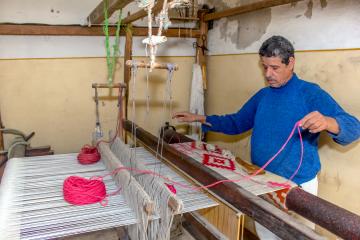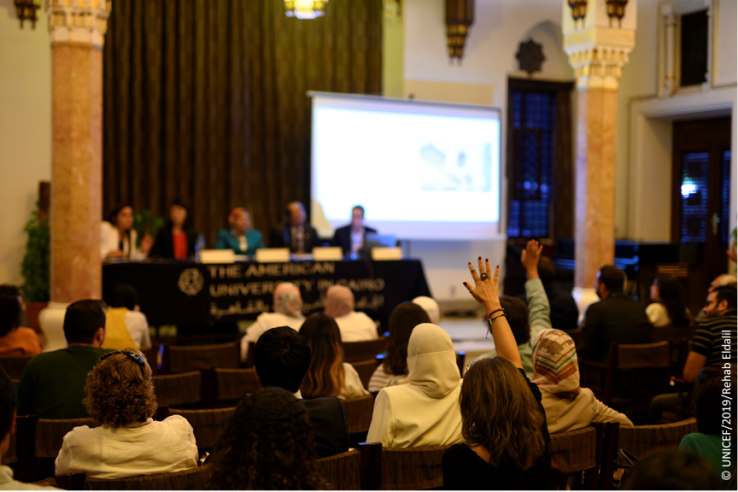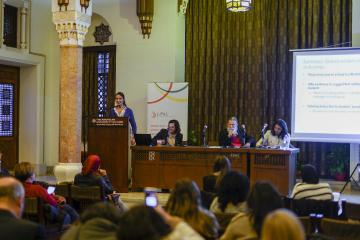
Launching J-PAL’s newest regional office in the Middle East and North Africa

A letter from J-PAL MENA's Scientific Directors and Interim Executive Director.
In the MENA region, the COVID-19 health crisis and corresponding extraordinary economic shock compounds pre-existing development challenges: children in MENA countries have among the lowest learning outcomes, youth and women already struggle to find quality employment, women’s agency is among the lowest in the world, environmental and energy resources are being challenged in several countries and conflict has left many communities facing displacement and in need of humanitarian assistance. Yet in the face of such pressing challenges, MENA governments, NGOs, and the private sector are developing creative new approaches to tackle these urgent priorities.
Today we are pleased to announce the launch of J-PAL’s regional office in MENA, based at the American University in Cairo (AUC). In collaboration with Community Jameel, J-PAL MENA will help tackle these pressing issues by working with innovative regional policymakers to co-design, evaluate, and scale effective approaches to reducing poverty and to improve the lives of the region’s most vulnerable.
Responding to local policy priorities
Typically, launching a regional office would come along with celebration. At this moment of global pain and uncertainty, we are deeply cognizant of the responsibility to build an institution that is responsive to regional priorities, that is locally-grounded while also being globally-informed, and that commits to always working with and on behalf of the region’s most marginalized.
We are thrilled to be part of the AUC’s School of Business. The university has a history of being at the nexus of academia and policy both in Egypt and across the MENA region, with a commitment to student development, engagement outside the classroom, and ensuring research has practical applications.
Though today marks the launch of J-PAL’s newest regional office, it is also the continuation of many years of work in Egypt and across MENA. The three of us, the J-PAL MENA team, our colleagues at AUC, several J-PAL affiliated professors, and our creative and committed implementing partners have been leading research, policy, and training work in MENA for more than a decade. Along the way, we have learned not only that it is possible to conduct high-quality randomized evaluations in the region, but that there is tremendous demand for an evidence-based approach to designing social programs.
Strengthening local partnerships to prioritize under-studied topics
Our work to date in the region has afforded us the opportunity to partner with governments, civil society organizations, and international organizations to rigorously test innovative programs. Across the region, we and our colleagues in the J-PAL network have worked on more than 20 ongoing and completed impact evaluations in 9 countries in the region.
These studies seek to address many of the region’s priorities, including strengthening social protection for the most vulnerable, understanding the evolution of gender norms, reducing barriers to entry for female job seekers, fostering growth of micro small and medium enterprises, and serving refugees and host communities.
While we have made significant progress, the list of important but under-researched topics in MENA—including forced displacement, livelihoods, gender, education, health, and climate change—is long. Innovative communities of NGOs, foundations, and government ministries are hard at work in the region tackling these and other issues, and we are thrilled that J-PAL MENA will be able to draw in J-PAL affiliated professors to launch new research partnerships together with implementing organizations to generate locally-relevant research.
Building a research ecosystem
J-PAL MENA is committed to building an ecosystem for rigorous research and supporting a culture of evidence-based policy. Our colleagues Abhijit Banerjee, Esther Duflo, and Michael Kremer won the 2019 Nobel Prize in Economics for this experimental approach to reducing global poverty; and we are proud to bring our expertise in this approach into our partnerships with regional academics and policymakers in MENA.
We aim to make J-PAL MENA a go-to resource for governments and private sector entities seeking actionable guidance to inform effective policy design or wishing to partner on rigorous evaluation of their programs. We’ll lead trainings for local research staff on best practices in randomized evaluation methodology, create resources for researchers and policymakers that take into account local contexts, and host research assistants and survey staff working on randomized evaluations in the field.
Work with J-PAL MENA
There are several ways to join us in this important work. First, we are hiring! Our work in the region until now would not be possible without talented staff. We are excited to build on this foundation to expand our team of development economists, policy professionals, and training experts who can help us execute J-PAL’s vision in the region.
Second, while we hope to celebrate this launch in person at AUC in the future, in the meantime we invite you to join us, AUC, and some of our implementing partners for a webinar to introduce J-PAL’s work and the use of randomized evaluations in decision-making in MENA. The webinar will take place on Tuesday, July 21 at 3 pm EET. Be sure to register in advance.
Third, we would like to hear from you about how J-PAL MENA can best support development priorities in the region. Would you like to partner to evaluate your organization’s program? Would you like to learn about how global evidence can inform your organization’s strategy or program design? Contact us with your ideas and questions.
Finally, we want to thank all of the existing partners who have made this work possible, including our close partners at Community Jameel. Community Jameel has been a longstanding partner of J-PAL around the world, and understands the importance of building J-PAL MENA at AUC as a hub for generating locally-relevant research and collaborating on evidence-informed decisionmaking in MENA.
We look forward to sharing more updates as J-PAL MENA’s work ramps up. For more information, visit our regional office page.



